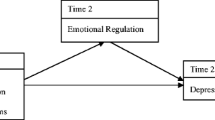Summary
Life events appear to exert a range of effects on subsequent behaviour through their impact on affective-cognitive processes. Their effects on those physiological processes pertinent to psychopathology have yet to be investigated. Single events do not exert much risk for subsequent disorder. It is the pattern of adverse life experiences, of which recent life events is frequently a component, that determines the degree of risk and the mechanisms and processes that may lead to subsequent psychopathology.
Recall of events that occurred in the recent past may be influenced independently by the age of the individual and a previous episode of psychiatric disorder. Longitudinal studies determining the impact of life events on subsequent behaviour will need to take these features into account. There remains no specificity between particular types of recent undesirable life events and anxious or depressive disorders. Future longitudinal research should employ modern methods of life event data collection and measurement. The goal of future longitudinal research should be to determine the relative contribution of undesirable and desirable recent life events in the presence and absence of other putative casual factors from different domains. This should necessarily include social (e.g. longterm difficulties), psychological (e.g. temperament (18) or self esteem) and physiological (e.g. hypercortisolaemia in adolescent major depression (14, 11) elements. It is only through this combination of longitudinal design, together with sensitive and concurrent multiple repeat measurements that a greater understanding of the mechanisms and processes that determine psychopathology over the course of development will occur.
Similar content being viewed by others
References
Bartlet F (1932) Remembering: A Study of Experimental and Social Psychology. Cambridge University Press, Cambridge
Berden GFMG, Althaus M, Verhulst FC (1990) Major life events and changes in the behavioural functioning of children. Journal of Child Psychology and Psychiatry 31:949–960
Berney TP, Bhate SR, Kolvin I, Famuyiwa OO, Barret ML, Fundudis T, Tyrer SP (1991) The context of childhood depression: the Newcastle childhood depression project. British Journal of Psychiatry (suppl. 11) 159:28–35
Brown GW, Harris T (1978) The social origins of depression. Tavistock Press, London
Brown GW, Harris TO (1989) Life Events and Illness. Guilford, New York
Brown GW, Bifulco A, Harris TO (1987) Life events vulnerability and onset of depression; some refinements. British Journal of Psychiatry 150: 30–42
Brown GW, Lemyre L, Bifulco A (1992) Social factors and recovery from anxiety and depressive disorders: a test of specificity. British Journal of Psychiatry 152:44–54
Brown GW, Adler Z, Bifulco A (1988) Life events difficulties and recovery from chronic depression. British Journal of Psychiatry 152:487–498
Brown LP, Cowen EL (1988) Children's judgements of event upsettingness and personal experience of stressful events. American Journal of community Psychology 16:123–135
Compas BE (1987) Coping with stress during childhood and adolescence. Psychological Bulletin 101:275–302
Dahl R, Puig-Antich J, Ryan N et al. (1989) Cortisol secretion in adolescent with major depressive disorder. Acta Psychiatrica Scandinavica 80:18–26
Dubois DL, Felner RD, Brand S, Adam A, Evans EG (1992) A prospective study of life stress, social support, and adaptation in early adolescence. Child Development 63:542–557
Goodyer IM, Kolvin I, Gatzanis S (1985) Recent undesirable life events and psychiatric disorder in childhood and adolescence. British Journal of Psychiatry 147:517–523
Goodyer IM (1990) Life experiences, development and childhood psychopathology. John Wiley, Chichester, U.K.
Goodyer IM (1993) Developmental psychopathology — the impact of recent life events in anxious and depressed school-age children-Journal of the Royal Society of Medicine (in press)
Goodyer IM, Altham PME (1991) Lifetime exit events in anxiety and depression in school-age children-I. Journal of Affective Disorders 2:229–238
Goodyer IM, Germany E, Gowrusankur J, Altham PME (1991) Social influences on the course of anxious and depressive disorders in school-age children. British Journal of Psychiatry 158:676–684
Goodyer IM, Altham PME, Secher A (1993) The recall of recent life events by 11 to 16 year olds in the community: influence of age and past psychiatric disorder. (Unpublished manuscript)
Goodyer IM, Ashby L, Altham PME, Vize C, Cooper PJ (1993). Temperament and Major Depression in 11–16 year-olds. Journal of Child Psychology and Psychiatry 34:1409–1423
Holmes T, Rahe R (1967) The social readjustment rating scale, Journal of Psychosomatic Research 11:213–218
Lazarus RS, Folkman S (1984) Stress, Appraisal and Coping. Springer, New York
Meyer A (1957) Psychobiology: A Science of Man. Charles C. Thomas, Springfield, IL
Miller P McC, Ingham JG, Kreitman NB, Surtees PG, Sashidhoran SP (1987) Life events and other factors implicated in onset and in remission of psychiatric illness in women. Journal of Affective Disorders 10:203–206
Monck E, Dobbs R (1985) Measuring life events in an adolescent population: methodological issues and related findings, Psychological Medicine 15: 841–850
Paykel ES (1978) The contribution of life events to causation of psychiatric illness, Psychological Medicine 8:245–253
Rende RD, Plomin R (1991) Child and Parent perceptions of the upsettingness of major life events. Journal of Child Psychology and Psychiatry (32) 63:27–633
Rutter M, Sandberg S (1992) Psychosocial stressors: concepts, causes and effects, European Journal of Child and Adolescent. Psychiatry 1:3–14
Sandberg S, Rutter M, Giles S, Owen A, Champion L, Nicholls J, Prior V, McGuiness D, Drinnan D (1993) As sessment of Psychosocial Experiences in Childhood: Methodological Issues and Some Illustrative Findings. Journal of Child Psychology and Psychiatry 34:879–897
Yamamoto K, Soliman A, Parsons J, Davis OC, Jr (1987) Voices in unison: stressful events in the lives of children in 6 countries. Journal of Child Psychology and Psychiatry 6:855–864.
Author information
Authors and Affiliations
Rights and permissions
About this article
Cite this article
Goodyer, I.M. Recent undesirable life events: Their influence on subsequent psychopathology. European Child & Adolescent Psychiatry 5 (Suppl 1), 33–37 (1996). https://doi.org/10.1007/BF00538541
Issue Date:
DOI: https://doi.org/10.1007/BF00538541




